In several African countries, students continue to raise concerns about affordability and inclusion.
Wits University’s main campus in Braamfontein, Johannesburg, came to a standstill on Wednesday as a throng of students protested against what they maintain are exorbitant tuition and residence fee increases for 2016.
Management of the university has apparently hiked fees up by 10.5% next year and the upfront registration fee by 6%, a decision that has enraged students. This takes registration at the university to just under R10 000. Students say these increments exclude many of them from attending the university.
The large group of protesting students staged marches and sit-ins across campus, largely targeting entrance and exit gates. This was the biggest protest the university had seen in recent years, involving thousands of mainly black students.
University spokesperson Shirona Patel confirmed that all lectures had been suspended for day, saying this was “in the interest of protecting the safety and security of staff and students”. But she confirmed that this measure had been taken “although everything is calm”.
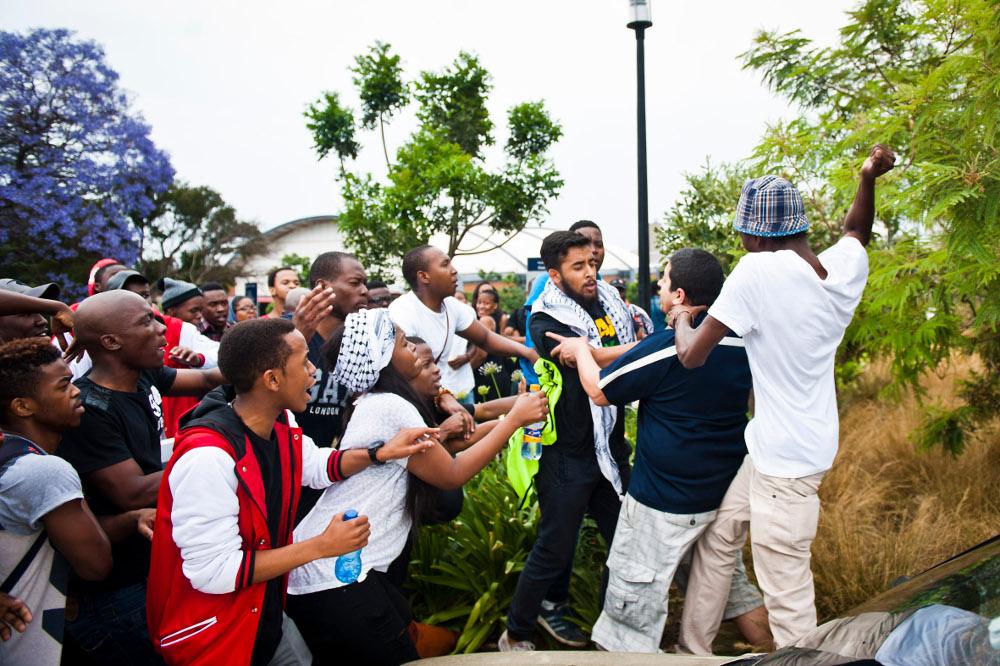
The protest had not yet subsided later on Wednesday afternoon. Student Mcebo Freedom Dlamini, who was axed earlier this year as president of the student representative council (SRC), told the protesting students when addressing them that the action was not just for one day, but would continue until management backtracked on fee increments.
“The university is used to mediocre leadership that will protest for [just] 30 minutes and go back to class. This is not a protest, [but] a complete shutdown. We’re going to render this institution ungovernable. We’re going to shut down Wits up until management comes to us and say there [will be] no fee increases,” said Dlamini.
“If you look around you there are workers, the cleaners,” he said, referring to outsourced workers who marched alongside the students. “This must tell you that the university under [vice-chancellor] Adam Habib has been and is still anti-black. As much as we’re fighting [against] fee increases, we’re fighting a system that is brutal.”
‘This institution belongs to us’
Nompendulo Mkhatshwa, president-elect of the incoming 2016 SRC, at times led the protest from the front. “This management must remember that this institution belongs to us [students], if you have forgotten. We don’t want this R9 900 [registration fee]. We don’t want their increasing fees,” she told students.
Students distributed thousands of pamphlets during the protest explaining their position on the increases. Under the heading “Being intelligent is not enough if you are poor”, the pamphlets said: “Wits University has taken a deliberate and anti-progressive decision to once more entrench the financial exclusion of poor students by exorbitantly increasing the upfront fee payment in particular and fees in general.
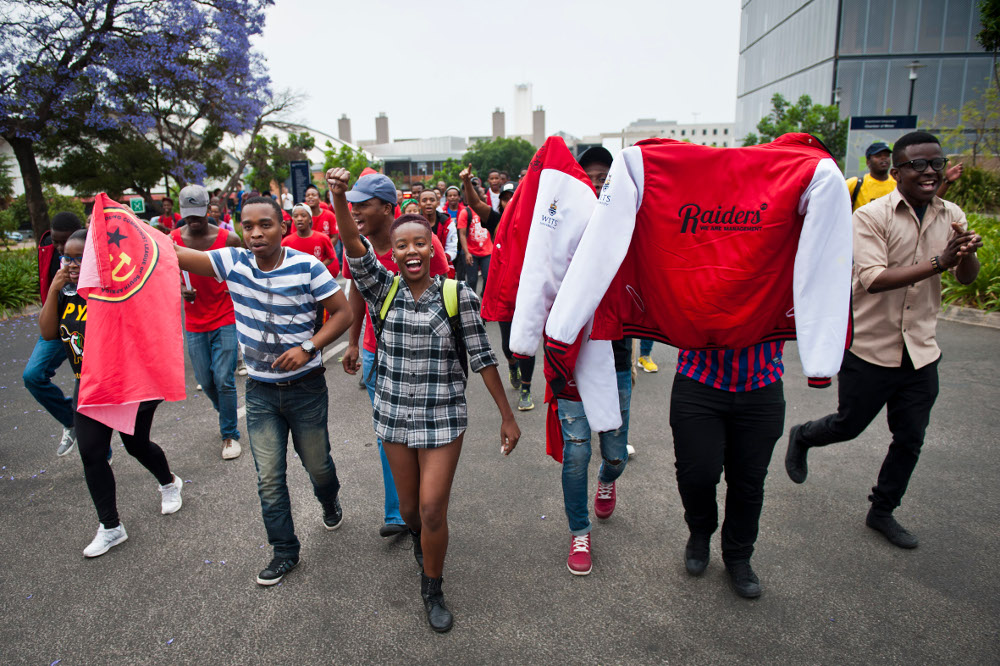
“We call on all students to stand with us in opposing these increases. Wits University is not a business and cannot be run in the interest of the minority. We are tired of the blatant lack of transparency and financial accountability on the part of the management.
“Enough is enough. The socioeconomic reality of students on this campus cannot be continuously ignored and deliberately undermined.”
A student who is on the National Student Financial Aid Scheme (NSFAS) told the Mail & Guardian that he feared the university’s fee increments would see him paying extra from his own pocket, so he joined the protest.
“As I’m on NSFAS and [the scheme] doesn’t increase at the same rate, it means I’ll have to pay more top-up. Already this year I paid this top-up since NSFAS didn’t pay all my fees.”
NSFAS has been facing a crippling shortage of funds for some years. Higher Education and Training Minister Blade Nzimande said earlier this year that the NSFAS funds crunch, which sees thousands of poor students excluded each year from universities, won’t be averted any time soon.
Demand for free education
A group of students calling themselves the Occupy Movement intermittently stage protests outside Nzimande’s offices in Pretoria, demanding that the government introduce free education at varsity level.
The students say NSFAS has “reached its sell-by date” as a viable funding model for poor students and that the only solution for these students is a cost-free university education.
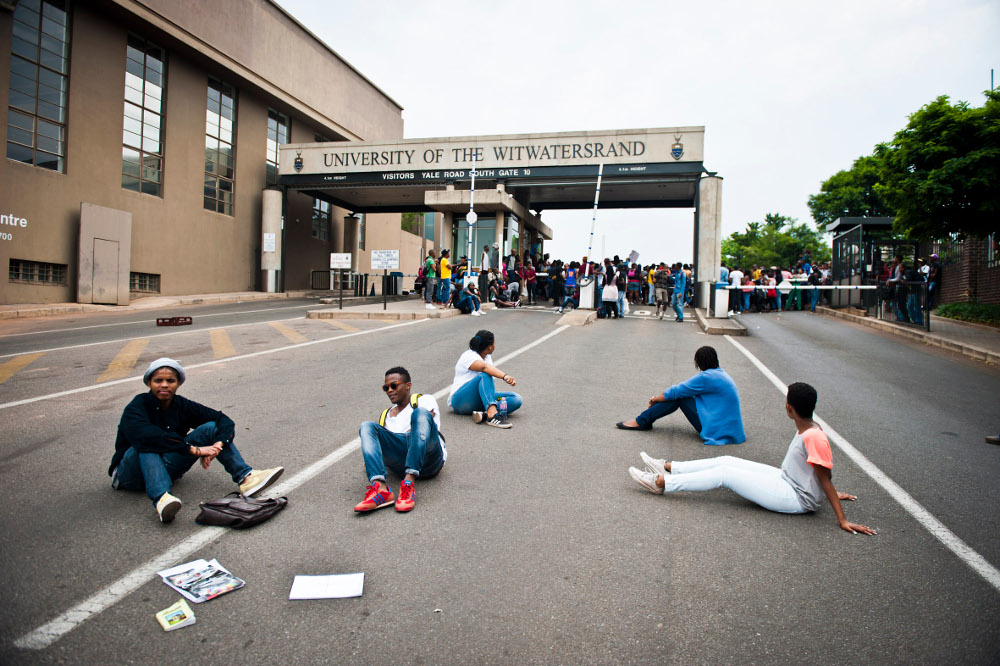
Students on bursaries at Wits fear repercussions of increasing fees. An accounting student with a bursary told the M&G: “My bursary has a cap, it doesn’t pay all my fees. My parents are paying outstanding fees.
“By merely being black, I obviously come from an [economically] oppressed family. The increases, which are on everything including food on campus, might render my family unable to raise the topping up fees. This would either see me dropping out or looking for another institution.”
Decline in state funding
Management said on Wednesday that it had no choice but to implement student fee increments because state funding to universities was declining.
Wits chief financial officer Linda Jarvis said: “The subsidy increase from government is expected to come in at around 5% and the net effect is that we have to make up our income to cover our expenditure in order to remain sustainable.
“If we do not do so, we put the quality of our academic project at risk. These increases are unfortunately unavoidable but we are doing all that we can, especially at the national level, to look at long-term solutions to resolve the issue of student funding.”
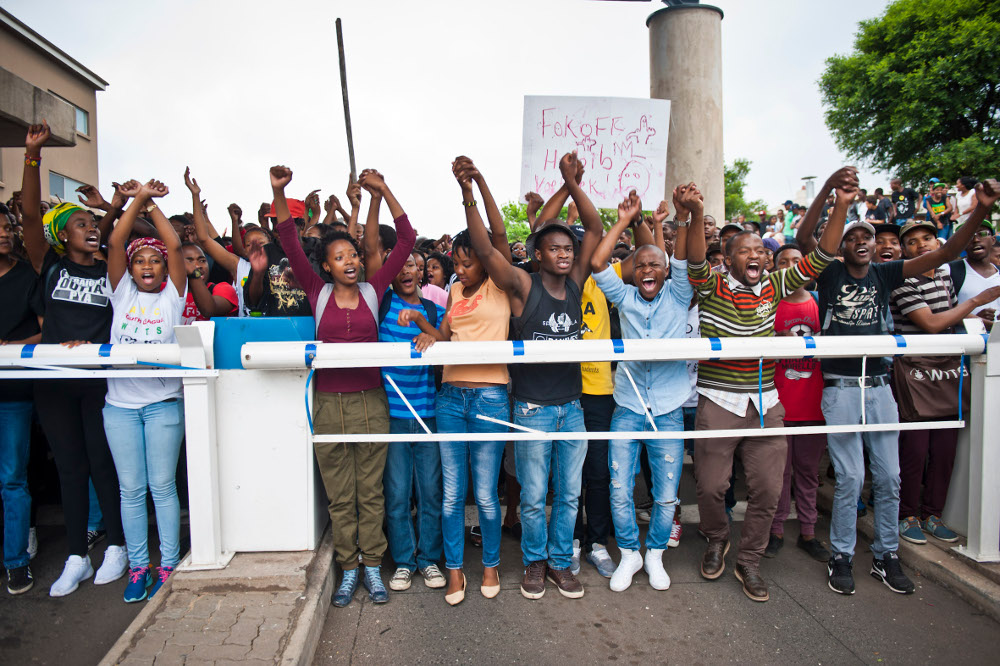
Jarvis added that following extensive consultations with the SRC and other university structures, management reduced the increase in average tuition fee for 2016 from 11% to 10.5% and the upfront fee increase from 10% to 6%.
“We are mindful of the current economic climate and the financial strain on students and families. Even though two thirds [about 20 000] of our students are on bursaries, scholarships and financial aid, we are cognisant of the pressure that this places on parents and caregivers of those who have to pay their own way.”
Nzimande has admitted previously that the state was not funding the country’s public universities sufficiently.
Third protest in two weeks
The protest at Wits was the third the institution has seen in two consecutive weeks. Last week students joined support workers to protest against outsourcing, a practice they say is exploitative.
On Tuesday a handful of students protested at the institution’s business school in Parktown against management’s decision to demolish a residence accommodating 150 students.
Students said they were protesting because management had resolved to dismantle the residence to make way for a car park. But university spokesperson Shirona Patel told EWN that management wanted to build new academic and research facilities.
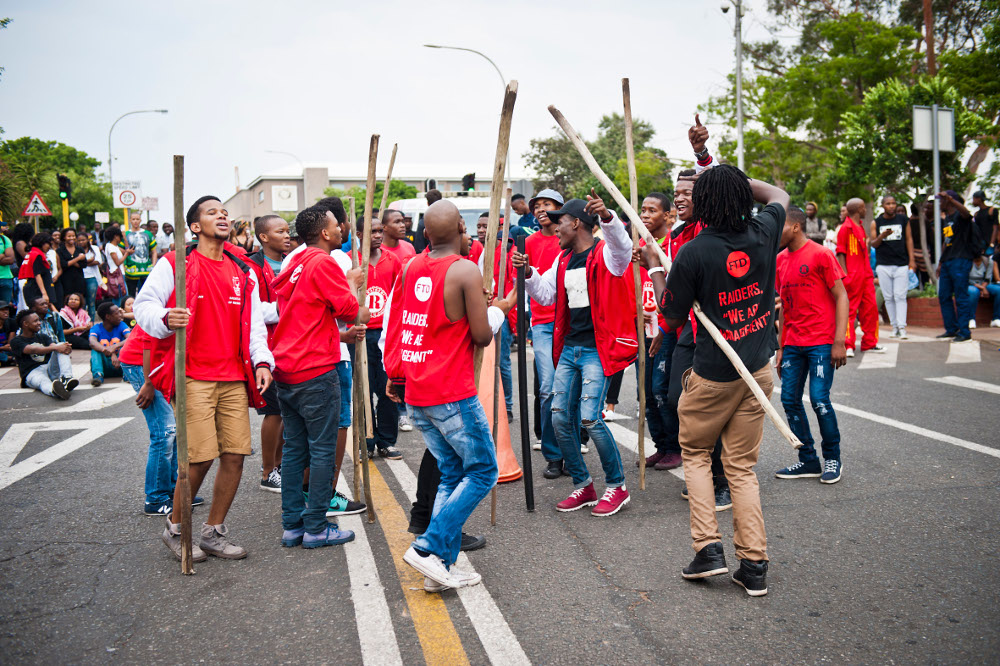
She said the 150 students in the residence would be relocated. “They are protesting against the university’s expansion plans in Parktown and Braamfontein, which will see one of the residences demolished next year and replaced with new research facilities.”
Wits management lambasted the protest on Wednesday and threatened disciplinary action against participants. The statement Patel issued said: “The protest violates the protest policy of the university and Wits’ student rules, and while the university recognises that students have a right to protest, this cannot happen at the expense of the rights of students and staff members to learn and work in a safe environment.
“Wits will take the necessary action in line with our policies and procedures to create an environment that allows teaching and learning to continue.”